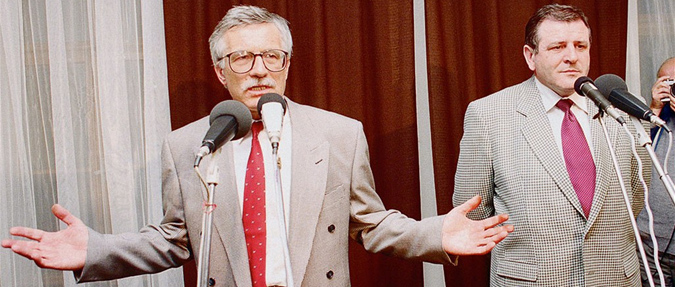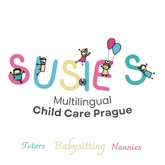On January 1st, 1993, Czechs and Slovaks didn’t just celebrate the New Year; they celebrated the creation of two new countries: the Czech and Slovak Republics. The separation, dubbed the ‘Velvet Divorce’, was hailed as an example of peacefully negotiated independence. Twenty years later, a majority of people accept the decision, though desire for a united Czechoslovakia still lingers with some.
Going Separate Ways
Those who pine for a united Czechoslovakia see the division as the work of two men: Czech Prime Minister Václav Klaus and his Slovak counterpart Vladimír Mečiar. At the time, the state was a federation with one president – Václav Havel – but a prime minister for each Republic.
On assuming power in 1992, Klaus and Mečiar tried to negotiate the terms of the federation. Mečiar was angling for a looser federation. Klaus apparently found the demands surprising; despite the fact Mečiar had been quite open about his desires. But it wasn’t just nationality which divided the men. Klaus was – and remains – an advocate of free-market economics (at least in theory). Mečiar wanted to retain some level of state support for the Slovak economy. Havel, who wanted to keep the federation, resigned in July 1992 when separation looked inevitable.
Given the supposed unpopularity of the decision to split at the time, it is tempting to see the separation as due to the actions (or ineffectiveness) of these men. Through 1991 and 1992, support for a united federation remained high, especially in the Czech lands. In Slovakia, it had majority support in 1991 but waned by July 1992. No wonder the two leaders were against a referendum.

Václav Klaus & Vladimír Mečiar
Though the view is tempting, it ignores the cultural differences and points of conflict between the two nations. While Czech and Slovak relations were not on the whole marked by the ethnic tension seen in other post-communist states – a fact supported by Dr. Helena Nosková, assistant editor of Listy, a periodical published by the Klub Slovenskej Kultúry (Slovakian Culture Club) – the desire for independence was there.
“This discontent had been covered over by communism,” Nosková said.
Discontent was both immediate and long reaching. Slovaks worried about Czech privatization and ‘wild capitalism’ – which, in hindsight, are well-founded given the scandals that emerged over the voucher system. Some Czechs resented ‘supporting Slovakia’ and saw shedding Slovakia as a means of getting into Europe.
Funny enough, it was Slovakia which integrated more fully, joining the Eurozone in 2009 while the majority of Czechs are against joining. This is not the only matter in which Czechs have changed their mind.
Looking Back
Twelve years after the separation, a survey by Středisko Empirických Výzkumůn (STEM) showed a marked change in attitudes. After a decade, more Czechs and Slovaks were in favor of the split.
From the beginning I was for the separation of the Czecho-Slovak Federal Republic and I haven’t changed my attitude.
Czech Republic 18% Slovak Republic 15%
I was for the separation of the Czecho-Slovak Federal Republic, but today I think it was a mistake.
Czech Republic 6% Slovak Republic 12%
I was against the separation of the Czecho-Slovak Federal Republic, but today I think it was a right.
Czech Republic 23% Slovak Republic 14%
I was against the separation of the Czecho-Slovak Federal Republic, but I have come to terms with it.
Czech Republic 31% Slovak Republic 32%
From the beginning I was against the separation of the Czecho-Slovak Federal Republic and to today I haven’t come to terms with it.
Czech Republic 22% Slovak Republic 27%
Figures courtesy of STEM 2005.
In the same survey, STEM found that 72% of Czechs and 61% of Slovaks had changed their mind since the time of the separation. Interestingly, those who identified as left-wing tended to oppose the separation (42%), while those who were on the right were more in favor (26%). The survey also included many younger people, who were children at the time of the split. They supported the change much more than the older generation.
STEM wasn’t able to provide a more recent survey, but two of the major Czech dailies ran recent surveys which show that a majority remain in favor. A poll in iDnes showed that 62% of a little over 12,000 respondents were in favor. Lidovky’s much smaller sample group gave almost exactly the same proportion.
Slovaks in the Czech Republic
Conflicting figures emerge over the number of Slovaks in the country. According to last year’s census, there were 120,000 people who identified as Slovaks. Based on citizenship, the number is 84,000. The number of students is estimated at around 30,000. It’s true to say that – at least from personal experience – you can meet Slovak people at all levels. I spoke to some of these people to get their views on the split and the relations between the two nations.
Views Across the Generations
Given these figures, it was surprising to find both Czech and Slovak who were not in favor. Vlado – who only gave his first name – is an investment consultant working in Prague. He was quite passionate in his opposition. “Why did I need a new citizenship? I’m Czechoslovak.” Vlado is sure that most people feel the same way as he does.
His countryman Darius admitted that at the time he was opposed to the separation, but now sees it as benefit – even a paradoxical one. “In many areas it brought closer togetherness and enhanced cooperation,” he said. The strength of the relationship has been reiterated by everyone I spoke with.
Zbyněk Adam runs Slovenské knihy on Jilská Street in Prague’s Old Town. Adam is Czech and so are most of his customers. He felt the separation was a good thing and agreed with it even at the time.
“We’re not squabbling over who has to pay for what,” he said.
The few young Slovaks and Czechs I spoke with show equally diverse opinions. These three were all small children or born around the time of the split, so for them the two republics has always been a reality.
Tomáš Hanzalík, David Hrdina, and Michaela Bůnová are Czechs, who fall into two camps. Tomáš and Michaela both thought the break-up was not a good idea.
“It would have been better if we stayed united,” said Tomáš. “If you look at the EU, the bigger the country, the more power they have.”
Michaela agreed that it would have been better to stay united. “We would have been stronger,” she said.
David, however, thought the separation was a positive step. He reasoned it was better for the Czech Republic. “In my opinion, [Czechoslovakia] was slowing down our [Czech] industry. Slovakia was on a much lower level.” What’s interesting is of the three David was the only one to say that he had some Slovakian heritage. His grandmother is Slovak.
Andrea Kulitová, a Slovak student, had different perspective. She said that she had always taken the Czech Republic as a foreign country, and that her identity was Slovakian. “From my childhood, I remember that [it was] clear and normal that I’m Slovak, not Czechoslovak, so for me home was just Slovakia.”
Her description of her relationship with Czechs was a mixture of rivalry and camaraderie. She has Czech friends, she’s studied and lived here, but when it comes to sport she might support another team. Similar, if not more intense, porting rivalry can be found among states in closer federations.
All the four had slightly different responses to the question of understanding. The three Czechs said they understood though the degree varied. David, who watches Slovak TV shows, said he had no problems. Michaela and Tomáš said they understood most of it.
“I understand about 95%,” Michaela said. “The rest I wonder what the hell they’re saying.”
Andrea, however, has found some Czech people who, in her opinion, don’t want to understand Slovakian. She herself has no problem with Czech.
Two decades on, it seems whether through pragmatism, national determinism, custom, or simple resignation the majority in both countries have accepted the situation. Even the two young Czechs who thought staying together was a good idea realized that the current situation won’t change. And maybe their attitudes – while not necessarily universal – show the best compromise: that separation doesn’t have to mean antagonism.
What are your opinions? Should the two nations have remained a federation, or was separation the best option?
Related articles












 Reading time: 6 minutes
Reading time: 6 minutes 
























